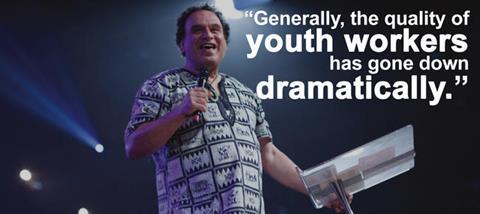
Yes, and – I think – yes. And at a time when Christian youth work is somewhat reeling, you’d perhaps be forgiven for finding that just a little bit offensive, especially if you currently happen to be a youth worker. How dare he say that? How could he possibly know how good my youth work is, or be able to assess my ‘quality’ as a youth minister? Doesn’t he know how hard it is out there on the front line?
But before you rush to condemn the man in a flurry of strongly-worded tweets, let’s just stop to think about who is saying this, and why. For a start, this isn’t some 23-year-old platform-hunter who’s found his way on to a conference stage by virtue of being in the right home group; this is Mike Pilavachi. He’s invested more than three decades in youth ministry, mentoring and working alongside hundreds of leaders throughout that time. If anyone has the right to make such a claim, or deserves to be listened to on the subject of youth ministry, it’s him.
Let’s consider what he really means. I don’t believe for a moment that he’s suggesting that youth work provision has declined in quality, that we’ve got worse at connecting relationally with young people. I don’t think he’s ignorant of how much money, resource and support has disappeared from the sector – including some of the training events that both he and I were involved in providing. And as he goes on to explain, the numbers of youth leaders leaving the specialism to become adult church leaders is frustratingly robbing us of a whole tier of more experienced leaders. He’s aware it’s got harder; he’s not kicking us when we’re down.

I think he’s getting at something else, something more fundamental. If you know anything about Mike, you know that he’s passionate about Jesus, and about leaders developing a close personal relationship with him. For Mike, a good quality leader is one who is walking alongside and modelling the radical path of Christ to young people. And I think that’s where he sees a decline.
For Mike, a good quality leader is one who is walking alongside and modelling the radical path of Christ to young people.
If we could somehow travel back to 1991 and meet the ‘average’ youth worker, I think we’d find a rather earnest young leader. They’d be rather sober (literally of course), and their bookshelves would be filled with popular theology books which they purchased earlier that year at Spring Harvest. Their music collection would be groaning in anticipation of the arrival of Delirious?, and the most explicit VHS on their shelf would be a dog-eared copy of The Cross and the Switchblade. They’d spend a lot of their free time thinking through their theology, and searching the scriptures for evidence to back it up. They would have daily quiet times. They probably even subscribed to Selwyn Hughes' Every Day with Jesus.
Alright, I possibly exaggerate for effect (although that does pretty much describe the social and cultural lives of my youth leaders in the 1990s). But let’s consider the average youth leader in 2016. What is the kind of cultural material with which we’re filling our minds? What’s driving our theology? Scripture, or really compelling blogs from people who just… can’t… even believe in a God who would behave like that? How much time are we investing in reading the Bible, or in our personal devotional time? Most of us are a far cry from the place we were in 25 years ago. Of course this might not apply to you. If so, don’t worry, this message is for someone else.
The rest of us naturally hate the challenge, but I think Mike’s got a painful point. As a general rule (yes, obviously there are many exceptions), we’ve loosened the expectations on holiness in the modern church; we’ve relaxed the requirements for character development and spiritual discipline. Grace, as it does, has covered a multitude of sins, but perhaps we’ve allowed it to do so too cheaply. Many of us are just – as the brilliant Katie Dowds puts it – just living a PG-certificate version of what the world is doing; recognising that’s also shifted dramatically in the last 25 years.
So for a moment, what if we didn’t bother getting offended by Mike’s statement. What if instead we saw it as a challenge from a prophetic voice who has earned the right to say something a little bit outrageous? What if we recommitted ourselves to re-developing our passion and our personal relationship with Jesus? I think generally, the quality of youth workers might go up dramatically.
Click here to request a free copy of Premier Youthwork magazine




























